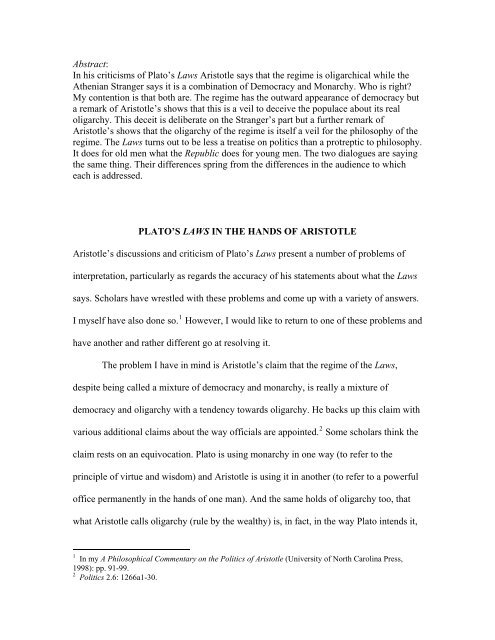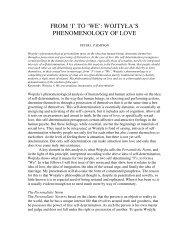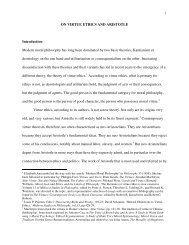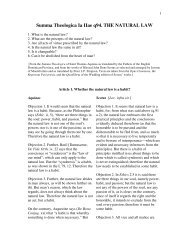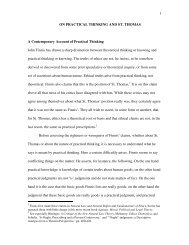PLATO'S LAWS AT THE HANDS OF ARISTOTLE
PLATO'S LAWS AT THE HANDS OF ARISTOTLE
PLATO'S LAWS AT THE HANDS OF ARISTOTLE
You also want an ePaper? Increase the reach of your titles
YUMPU automatically turns print PDFs into web optimized ePapers that Google loves.
10Athenian or Plato would assent to the view that virtue always or necessarily accompanieswealth. 21 Thus it does indeed turn out, as Aristotle said, that there is nothing monarchicalin the regime, for there is nothing in the regime to ensure the presence there of virtue orcapacity as an independent factor over and above wealth. Attempts to get round thisproblem by denying the oligarchic effect of the constitutional provisions, as in particularby Stalley, are not convincing. They are simply in conflict with the evidence. Theconstitutional provisions are what they are and they will have the effect that they willhave regardless of what the Athenian says or does not say. “By their deeds ye shall knowthem.” Aristotle’s general charge, then, that the Laws is biased towards oligarchy, mustbe allowed to stand.Why then should scholars want to deny this charge? My sense is that they wouldnot want to, or would want to less, if there were a clear and convincing way of absolvingPlato of the further charge of being confused about what he was really doing. 22 Mysuggestion, mentioned at the beginning, that Plato is being deliberately deceptive ismeant to provide such a way. However, I need to explain both how this works and how itdoes not discredit Plato. Now we do, of course, find deliberate deception elsewhere in thePlatonic dialogues. We find it, in fact, quite openly used in the Republic. 23 The reason forthe deception in the Republic is clear enough: to keep the lesser types content with theirlesser condition. The same is also true of the Laws. Certainly the use of the lot isrecommended in the Laws on the grounds that it will keep the lesser types quiet. The fact,then, that this use is more apparent than real, and deliberately so, confirms its deceptive21 A point that Barker in particular stresses, op. cit., p.389.22 Stalley, for instance, seems driven in this direction in part because of Barker’s failure to absolve Plato ofsuch a charge; Stalley, op. cit., pp.117-20; Barker, op. cit., pp.389-90.23 Republic 459c-60b.10
11character. It is the sort of deception that Aristotle expressly has in mind, namelydeception in the formal provisions of the regime. But this still leaves open the question,not as to why Plato and the Athenian deceive the populace, but as to why they want touse this deception to shift things toward the wealthy. For the wealthy are not, either assuch or for Plato and the Athenian, the same as the virtuous and the wise. Yet it is in thename of virtue and wisdom that Plato and the Athenian shifts things toward the wealthy.So what is going on here?My suggestion, following another hint of Aristotle’s, is that Plato and theAthenian are not only deceiving the populace; they are also deceiving the wealthy and,moreover, deceiving Clinias, Megillus, and us the readers. The hint from Aristotle is thatPlato in the Laws brings things round little by little back to the regime of the Republic. 24Barker draws our attention to this reference when he notes the change in tone in thetwelfth book of the Laws. 25 There is indeed such a change, but I think we should makerather more of it than Barker does. The Republic, as we know, quite expressly puts rule inthe hands of the few wise, the few philosophic sages. The Laws ends up doing the same,and primarily through two new offices that are introduced in the twelfth book. I havemyself not discussed these offices yet, and Aristotle does not mention them either, or notby name, in his critique of the Laws. I think, nevertheless, that they are part of what heintends when he says that the Laws brings things round back to the Republic.The offices in question are those of the scrutineers and of the nocturnal council.Both these offices are vested with great dignity, authority, and prestige. They effectivelyhave the power of suspending, removing, and overruling all other offices. It is they, in24 Politics 2.6:1265a2-10.25 Barker, op .cit., p. 399.11
12fact, who will guarantee—if guarantee is possible—that the officers actually chosen willnot just be the wealthy, but also the virtuous (something not guaranteed by anything elsein the regime). The scrutineers are elected by all from all, and election is repeated untilthe number is reduced to three, who join the board of scrutineers that year and serve, asall scrutineers do, until the age of 75. As such, this cycle of election is a repetition of theoligarchic procedure already discussed. But there are other features present in this casethat are going to give a rather different result. The job of the scrutineers is to roam therest of the regime, as it were, and scrutinize all the other offices, imposing penaltieswhere penalties are due, and examining beforehand all those elected to office to see ifthey are fit for the office in question. 26 Their whole life, bearing, dress, distinction, andeven death is endowed with such awe and dignity as would impress upon all but the mostunscrupulous that by virtue alone, and not by craft, could any receive or occupy soexalted an office. Moreover provision is made, lest any scrutineer fail and go wrong, thatthe scrutineers should themselves be watched by everyone like hawks. The scrutineersare further described as the single most important factor in whether the city survives ornot. Similar things are true of the nocturnal council, which is described as the anchor ofthe city. Its job is to understand the target to be aimed at, how to hit it, and which lawsand which persons provide the best help in this regard. Since its membership includes themost senior guardians (including the current and past ministers of education), its controlover the fundamental law and structure of the city will be as profound, if not more so,than the control of the scrutineers over the management of its day to day business. In26 It is a standard provision in the Laws that those chosen to the other offices be subject to examinationbefore taking up office. Who is to do this examination is not expressly said in book six where the officesare discussed, but one can hardly doubt that it will be one of the functions of the scrutineers introduced inbook twelve.12
13short both offices together will be the simply controlling authority (and one should notethat nothing is said about it being impossible for a man to be a scrutineer and a guardianat the same time; indeed, given the qualifications of age and quality required, it is likelythere will be a lot of overlap). 27If we look further at what are said to be the necessary qualifications for being aguardian (and therefore the qualifications that successful candidates will be scrutinizedfor in advance of taking up office), it becomes apparent that these are virtually the sameas are required for someone to become a guardian in the Republic. The guardians of theLaws, in fact, will have to be as much philosophers as the guardians of the Republic.There are enough hints too that they will need to accept something like the classic theoryof ideas. 28 The engine for ensuring this result is the office of the scrutineers and thenocturnal council. These two offices sit, as it were, on top of the oligarchic structure setout in book six and almost literally force it round into a hierarchy of philosophers. Theoligarchy of the regime, hiding behind the veil of the balance and outward democracy ofthe regime, is itself a veil for the philosophy of the regime. It is not just the case, then,that the democrats are deceived into accepting an oligarchy; the oligarchs are deceivedinto accepting a philosoph-archy. In the end, it is not the upper classes tout court whorule, but rather those of the upper classes (and those too of the lower classes allowed toget through the oligarchic sieve) who are virtuous and wise and naturally fit to be trainedin virtue and wisdom. The merely rich, or the poor, who are in office but have no virtueand no or little capacity for virtue, will quickly be spotted by the scrutineers and either27 Laws 945b-48b, 951d-52d, 961a-62d.28 Laws 964a-69d.13
14removed or prevented from taking up office again. They will certainly not advance intothe highest reaches of the regime.It is here, I think, where we come to the most fundamental disagreement betweenAristotle and Plato on political questions. For Aristotle is far more sympathetic to themass than Plato ever shows himself to be. He really believes that virtue can be found inthe mass, and such virtue as deserves to be given some genuine and not merely apparentcontrol in the regime. 29 Platonic writings do not endorse this line of argument ofAristotle’s. The assumption always is that virtue and skill go with the few and the trained,never with the many and untrained. Now Aristotle would doubtless agree with thisassumption when it comes to the highest virtue. 30 Certainly his own best regime is asélitist and as undemocratic as Plato’s Republic. It is only as regards the lesser and secondbest regimes that they differ, and it is only here that Aristotle endorses and supports theclaims of mass virtue over the virtue of the few. But the reason for this disagreement is, Ithink, that Plato does not really believe in any second bests at all. True, he does make theAthenian say that the Laws is a second best, 31 but, as we have just seen, this second bestturns out not to be sustainable unless or until it is effectively turned round into the firstbest of philosophic rule. Plato remains divinely mad to the end.What is really going on, then, in the Laws is, I suggest, the same as what is reallygoing on in the Republic. Neither is a disquisition on politics proper. Both are ratherprotreptics to philosophy. The Republic is more obviously this. But the Laws is no less soin the end. The difference lies in the audience that is the object of the protreptic. In theRepublic it is enthusiastic young men. In the Laws it is staid old men. So just as the29 Politics 3.11.30 Politics 3.13.31 Laws 739a-e.14
15Republic turns on what excites young men (the thrill of tyranny, the common availabilityof wealth and women), the Laws turns on what excites old men (the respectability ofprivate property and families, the stateliness of legislation—the Laws is mainly laws,after all, as Aristotle said 32 ). The former replaces the thrill of tyranny and free food andsex with the thrill of philosophy and the Ideas; the latter replaces the stability of orderedrespectability with the stateliness of the philosophic heavens. So the Athenian, in hisdiscussion with Clinias and Megillus, pretends that the respectable upper classes, dulyprosperous and possessed of heirs from their own loins, deserve to rule just as such, andhe fashions his regime on that supposition, thereby producing a sort of moderatedoligarchy. That is enough to win the willing assent of the two old men. But these two oldmen do not realize that, by thus giving their assent, they have assented, not to oligarchy,but to philosophy, or they do not realize to what extent their love of respectability hasseduced them into accepting the dialectic of wisdom. Hence when the Athenian unveils,in the twelfth book, the philosophy that was secretly driving the oligarchy, they not onlydo not resist what he says, they even enthusiastically embrace it.In short, by appealing directly to private wealth, respectability, and age—all ofwhich Clinias and Megillus need no persuasion to embrace—the Athenian, withoutquestioning that appeal, changes it into a different appeal, the appeal of philosophy. Atthe end the change is rather remarkable. Clinias and Megillus, the staid old men, havebecome enthusiastic youths whom the Athenian has a hard time holding back. 33 Therespectable old man, by contrast, in the first book of the Republic, Cephalus, is quicklyrepulsed by Socrates’ philosophizing, and that largely because, deep down, he is not32 Politics 2.6: 1265a1-2.33 Laws 968b-69d.15
16respectable, just old. 34 Clinias and Megillus are genuinely respectable, but they are notphilosophic. The Athenian’s task is to make them philosophic, or to elicit their latentpassion for philosophy. He does it, as all protreptics must do it, by appealing to someother and not latent passion that can serve as a seduction into the other passion. Foryoung men this passion is one thing; for old men it is something else. No matter. Thepoint is to seduce. This seduction is the deliberate deception I really had in mind when Ispoke of deception at the beginning. It is not the deception of the ill-intentioned lie, butthe deception of the benevolent protreptic.The success of this protreptic is why I would want to argue that the Epinomis isgenuinely Platonic and the true continuation of the Laws. For it is the continuation of theunleashed enthusiasm for philosophy of Clinias and Megillus at the end of the Laws.They say then that they must force the Athenian into becoming a joint founder of the newcolony. 35 The forcing or persuading is what I propose has gone on between the twodialogues. So the second, the Epinomis, opens with the agreement already in place tocontinue where the Laws left off. For I imagine the three interlocutors now to beconversing as members of the new colony’s nocturnal council 36 and so as carrying outwhat was left as a task for that council at the end of the Laws, namely the curriculum ofstudies. 37 But this claim doubtless needs more argument than I can give it here.At all events I would at least want to assert the following. While the Republic isPlato’s protreptic for young men tempted by the wild but base pleasures of tyranny, sothe Laws is his protreptic for old men comfortable in the quiet pleasures of traditional34 Republic 330d-31d.35 Laws 969c-d.36 Epinomis 992e.37 Laws 968c.16
17respectability. In both cases the seduction works: it produces philosophic enthusiasm. It isnot true that philosophy can only or best be taught to the young and daring; it can also betaught to the old and staid. One just has to find the right tools for the seduction. And theseduction works on readers too, only it works on different readers (it is no accident, forinstance, that we teach the Republic and not the Laws to our freshmen classes). Bothdialogues go together. They belong equally to the fullness of Plato’s protreptic art. TheLaws should not, therefore, be read as a later writing than the Republic (even if it is), norshould it be read as a later development of Plato’s thinking. The chronological division ofthe Platonic dialogues gets no support, properly understood, from the style, character, anddoctrine of the Laws. The Laws is the same as the Republic, as Aristotle said. Thedifference in its fashioning is just that it speaks to a different audience.17


